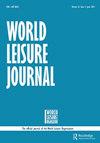社区跑步俱乐部的意向-行为关系:环境中休闲约束和促进因素的调节作用
IF 2
Q3 HOSPITALITY, LEISURE, SPORT & TOURISM
引用次数: 1
摘要
摘要虽然意图被认为是行为的最接近决定因素,但学者们指出了意图-行为的差距,呼吁研究约束或促进意图-行为关系的环境调节因素。本研究从生态学的角度考察了五种休闲约束和促进者对社区跑步俱乐部背景下跑步意向-行为关系的潜在调节影响。通过对美国中西部四个社区跑步俱乐部的成员进行重复测量设计,多层次模型的结果表明,跑步意图和时间可以显著预测实际的跑步行为。研究结果没有提供证据表明休闲约束和促进者(休闲约束、领导者自主支持、感知动机氛围、俱乐部运营和俱乐部计划)影响跑步意图和跑步行为之间的关系。这些结果为支持意向-行为关系提供了进一步的证据,并表明这种关系可能会在不同的背景下波动。本文章由计算机程序翻译,如有差异,请以英文原文为准。
Intention–behaviour relationship within community running clubs: examining the moderating influence of leisure constraints and facilitators within the environment
ABSTRACT While intention is considered the proximal determinant of behaviour, scholars point to an intention–behaviour gap, calling for research that accounts for the environmental moderators that constrain or facilitate the intention–behaviour relationship. Adopting an ecological perspective, the study examined the potential moderating influence of five leisure constraints and facilitators on the running intention–behaviour relationship within the context of community running clubs. Employing a repeated measures design with members of four community running clubs across the Midwest United States, results of the multi-level modelling indicate running intentions and time significantly predict actual running behaviours. The findings provide no evidence that the leisure constraints and facilitators (leisure constraints, leader autonomy support, perceived motivational climate, club operations and club programmes) influenced the relationship between running intention and running behaviour. These results add further evidence to support the intention–behaviour relationship and suggest this relationship may fluctuate across contexts.
求助全文
通过发布文献求助,成功后即可免费获取论文全文。
去求助
来源期刊

World Leisure Journal
HOSPITALITY, LEISURE, SPORT & TOURISM-
CiteScore
3.10
自引率
6.20%
发文量
34
期刊介绍:
As the official journal of the World Leisure Organisation, the purpose of the World Leisure Journal is to stimulate and communicate research, theory, and critical thought in all areas that address leisure, including play, recreation, the arts and culture, sport, festivals, events and celebrations, health and fitness, and travel and tourism. Empirical and theoretical manuscripts, as well as position papers, review articles, and critical essays are published in the World Leisure Journal . The World Leisure Journal is international in scope, and encourages submissions from authors from all areas of the world. Comparative cross-national and cross-cultural research reports are especially welcome. For empirical papers, all types of research methods are appropriate and the subject matter in papers may be addressed from perspectives derived from the social, behavioural, and biological sciences, education, and the humanities. Both pure and applied research reports are appropriate for publication in the World Leisure Journal . In addition to original research reports and review essays, book reviews, research notes, comments, and methodological contributions are appropriate for publication in the World Leisure Journal .
 求助内容:
求助内容: 应助结果提醒方式:
应助结果提醒方式:


